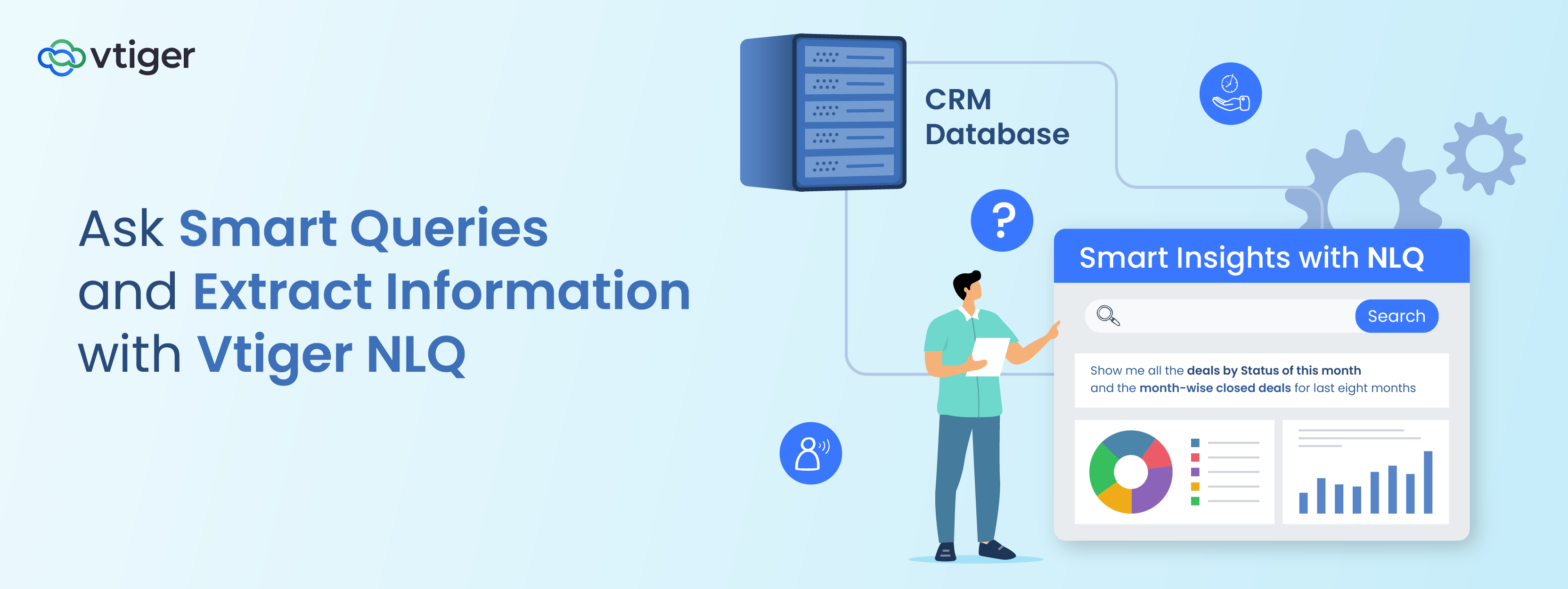A sales executive Sarah is staring at the mountains of data-sales count, product sold, and many other data. Despite having everything readily available, she is overwhelmed with the amount of information. Her manager wants analytics of the top products sold in a week. Suddenly she remembers about Natural Language Query (NLQ) in her CRM system and types a simple question- “Give me the report of top products sold between Feb 19 to Feb 23 in tabular format.” She quickly gets the result and reports it to her manager.
This isn’t a science fiction story but the reality of NLQ.
The demand for Artificial Intelligence (AI) and Machine Learning (ML) has made it easier for businesses to grow effectively. We use different mechanisms to execute specific activities, and NLQ is one among them. It enables users to interact with different applications using everyday language and make better business decisions. Let’s dive deeper into it.
Defining Natural Language Query
NLQ is one of the aspects of AI that makes human-computer interactions easier and more accessible using natural language. Instead of using programming languages, users can ask data-related questions or make requests in simple English. The system will quickly respond and provide you with accurate information. Please look at the two queries below:
- SELECT FirstName, LastName, FROM Employees WHERE Department=’Marketing’;
- Show me the first names and last names of employees in the Marketing team
The first example showcases traditional query language which may not be familiar to everyone. It typically requires technical knowledge to construct such questions using this syntax. On the contrary, the second example is a natural query which offers a more user-friendly approach allowing everyone to interact with the database in a natural human language.
One of the best examples of NLQ is a chatbot that every business uses to improve customer experience. You interact with the bot in a common language and get your queries answered. Even Google Search is another example that doesn’t require complex query language to extract information.
What NLQ in a CRM system can offer your business
Vtiger CRM, like many other AI-enabled CRMs possesses NLQ capabilities, and in Vtiger it is an integral part of Calculus AI.
We explored Calculus AI-powered with GPT features in the previous year. We highlighted its robust capabilities including generating email drafts, suggesting subject lines, and refining chat responses.
Special Offer: Experience the power of Vtiger Calculus AI as a whole for 3 months by signing up today!
Now, let’s quickly understand the queries you can use to fetch information from the CRM database using natural language. There is an Ask Calculus AI feature in Vtiger CRM.
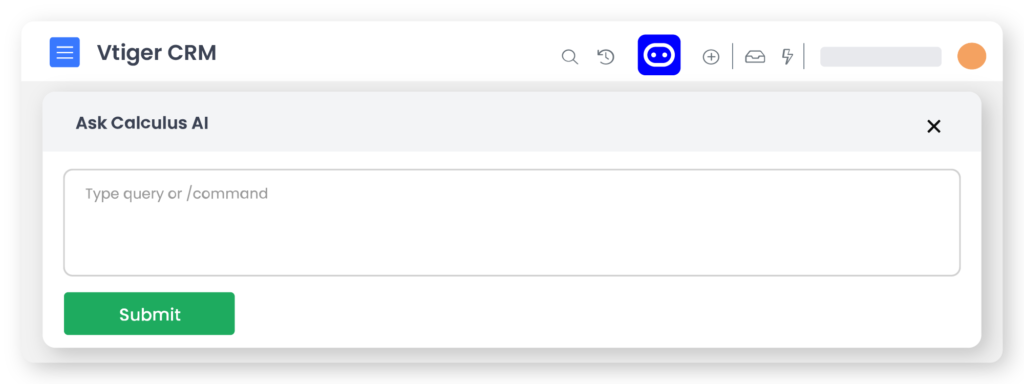
Type your question in the Calculus window to retrieve the following information:
Getting a summary of a record
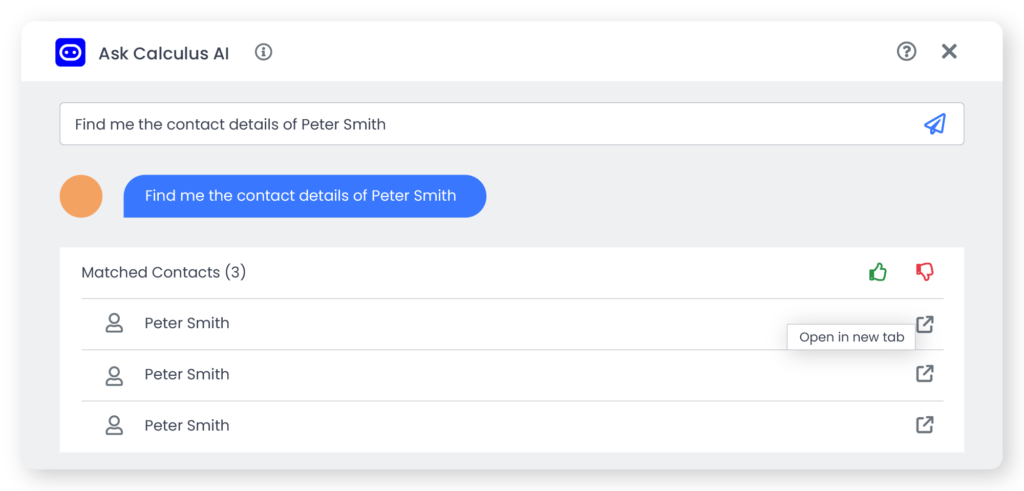
If you want to get information about a contact named Peter Smith, you can type “Summary of Contact Peter Smith” in the Ask Calculus search box.
The system will then present the details related to Peter like the date of record creation, open cases related to the contact, engagement score, etc. If there are multiple contacts with the same name, it will display information about each of them. Simply click on the relevant information that you need. This functionality extends to other modules, providing summaries of organization, cases, and so on.
Creating a record
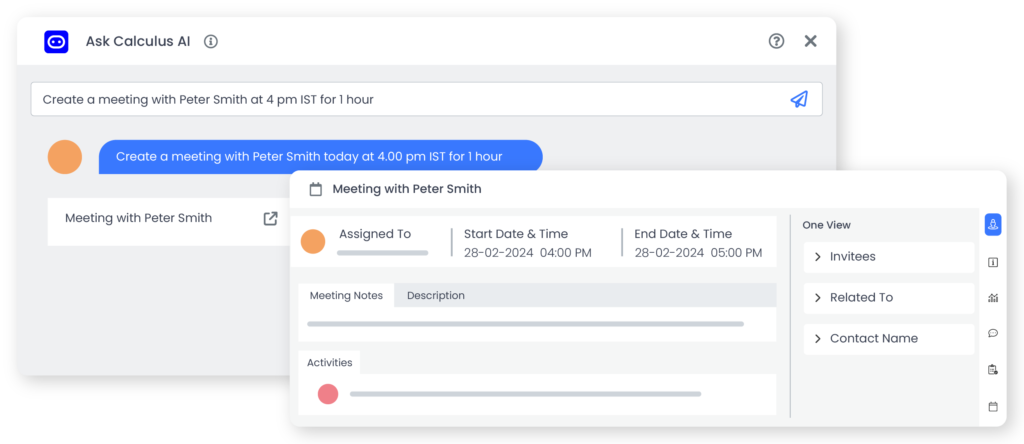
Suppose you would like to give a demo of a recently launched product to Peter Smith on March 15. Instead of creating an event from the Vtiger Events module, you can schedule the meeting by typing your request.
Mention “Create a demo meeting with Peter Smith on March 15, 2024. The CRM will quickly create a meeting event for you by adding all the relevant information.
Generating a Report
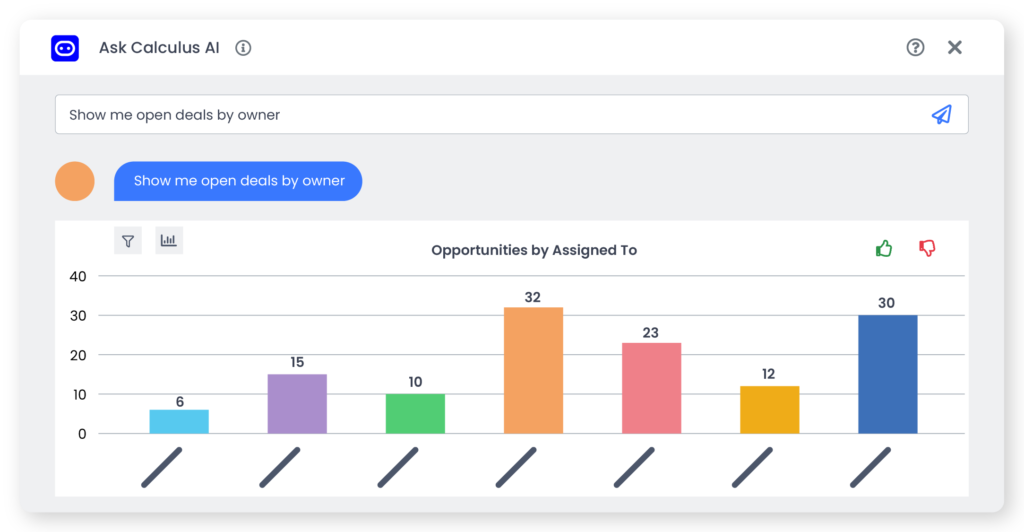
Similar to the above queries, you can produce robust reports of important information that you would like to know. You can extract information related to tasks/ meetings assigned to you for a particular day, week, or month; open deals or cases; and contacts created between a particular date.
Here, you can put Show me the report of my open deals by stage in the search bar. The result will be displayed in different formats like charts, pivot tables, etc. You can choose the format of your choice to view the details
Browse this section if you are interested in exploring other types of queries you can use.
You can also type a general query in the calculus window like compose an email by highlighting the offer to be sent to a potential lead, draft a 500-word blog about the latest CRM trends, or rephrase the chat response.
Top advantages of using NLQ in Vtiger CRM
By incorporating NLQ into your daily routine you can:
- Engage with CRM using ordinary language: You can interact with your CRM using natural language, making it more user-friendly for those who are not familiar with complex query languages. Queries such as “Give me a summary” or “Create a record” can get your work done at lightning speed.
- Improve data accessibility: You can access CRM data seamlessly like the details of tasks assigned to you, status of the deals, contacts created on or between a particular date, and more. All this is possible by staying within a single window -Ask Calculus AI without toggling between different screens.
- Minimize the time spent on daily tasks: It’s a tiresome task to click on each module and set up meetings every day, do data analysis by drilling down volumes of data, and prepare a chart. With NLQ in Calculus AI, you can execute your tasks effectively in seconds, paving way to focus on other-priority activities and elevate productivity.
